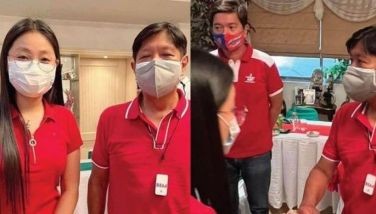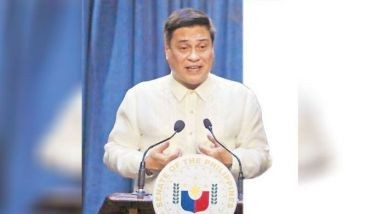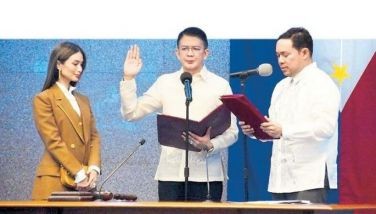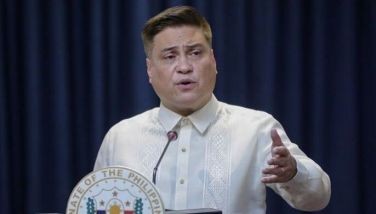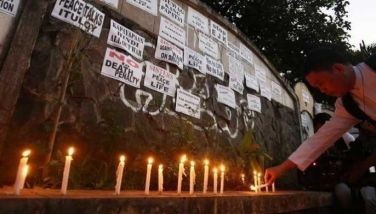Playing of tapes blocked anew by GMA allies in House
June 30, 2005 | 12:00am
President Arroyo’s allies in the five House committees inquiring into the "Gloriagate" tapes scandal yesterday blocked anew the airing of the recordings in public.
The President’s supporters ignored the views given two hours earlier by legal experts who had told the committees that they would not be in violation of the Anti-Wiretapping Law if they played the recordings in public, especially with Mrs. Arroyo’s admission that it was her voice heard talking to an election official on the tapes.
One of the experts, Fr. Joaquin Bernas of Ateneo, even warned members of the probe panels that suppressing the recordings could trigger a public backlash similar to what happened in January 2001, when supporters of ousted President Joseph Estrada among senators blocked the opening of the second Jose Velarde envelope.
Mrs. Arroyo’s allies prevented the five committees from airing the tapes by voting to adjourn yesterday’s hearing despite the clear presence of a quorum.
Three committees — defense, public order and information technology — supported the motion for adjournment, while two committees — public information and suffrage — voted against it.
Eastern Samar Rep. Marcelino Libanan presented the motion to adjourn after he failed to convince Minority Leader Francis Escudero to accept his suggestion that the recordings be played in a closed-door hearing.
It was Escudero who first proposed the recordings be played in open session.
He said the committees had argued since last week on the issue of whether or not to play the tapes, and on whether the airing should be done in public or in closed-door sessions.
"These issues keep going back and forth. We would resolve them now once and for all," he told his colleagues.
Escudero told reporters after the hearing was adjourned that he could not understand why the President’s allies were "afraid of the tapes."
"What are they afraid of? The President has already admitted it is her talking to an election official believed to be former commissioner (Virgilio) Garcillano. There must be something in the contents of the recordings that they don’t want the public to hear," he said.
Surigao del Sur Rep. Prospero Pichay Jr., a staunch ally of Mrs. Arroyo, meanwhile said Escudero and his opposition colleagues seemed to be following a script in their incessant demands that the tapes be played in public.
It was the second time in as many weeks that the President’s defenders had blocked the public airing of the recordings. Last week, they prevented the playing of a compact disc (CD) version of the tapes that Cebu Rep. Clavel Martinez presented to the committees.
At yesterday’s hearing, Escudero presented a motion to allow the public to hear the contents of the recordings after lawyer Alan Paguia, who last week turned over to the panels his CD versions of the tapes, suggested they be aired.
Besides Libanan and Pichay, other Arroyo allies who were most vocal in opposing the public airing of the recordings were neophyte Rep. Rodolfo Antonino of Nueva Ecija and Bacolod City’s Monico Puentevella, who has just returned from a three-week vacation in Europe.
Cavite Rep. Gilbert Remulla, the principal presiding officer of the inquiry, had to rule Antonino out of order because of the latter’s incessant interventions.
In the course of his short testimony, in response to questions raised by Escudero and Makati Rep. Teodoro Locsin Jr., Paguia said he received two original audiocassette tapes last May 15 from a source he refused to identify.
He said the conversation contained on the tapes lasted two to three hours, shortened down to 32 minutes on one cassette tape, the contents of which he later transferred to a CD.
He said that, among other personalities heard in "criminal conversations" on the tapes were the voices of the President, her husband Jose Miguel Arroyo, Garcillano and former senator Robert Barbers.
At this point, Barbers’ congressman-son Robert Ace, angered by the characterization and ignoring Remulla’s admonition against further interruptions, cut Paguia short, telling him not to make unfounded accusations against his father.
"That is unfair. We have nothing to hide. As proof of that, I will vote for playing the tapes in public," he said.
Before Paguia took the witness stand, the five committees heard the views of two legal experts, Dean Pacifico Agabin of Lyceum University and Dean Amado Valdez of the University of the East. Bernas and Dean Raul Pangalangan of the University of the Philippines College of Law submitted position papers.
In his position paper, Bernas said the public interest and the public right to information should outweigh privacy concerns and personal rights in the playing of the tapes or recordings.
"The contents of the alleged wiretapped materials are not merely of private concern, they are matters of public interest. Even if they are the product of wiretapping, there is good reason for allowing disclosure as, in fact, they are already being disclosed by private parties," he said.
Agabin said Mrs. Arroyo’s admission constituted a waiver of her right to privacy.
He said with the President’s admission, her taped conversations with an unnamed election official should be considered as "official acts."
Bernas said the citizen’s right to privacy "must give way when balanced against the interest in disseminating information of paramount public importance."
"Anyone who accepts public office also accepts an attendant loss of privacy," he added.
As to whether the five committees should play the tapes in an open session or closed-door hearing, Bernas said the committees should opt for a public airing of the recordings.
"In fact, now that President Arroyo has admitted that the voice on the tapes is hers, suppressing the tapes might trigger the kind of reaction that followed the refusal to open the second envelope in the Erap impeachment trial. The House should not be complicit in repressing speech that is of high public interest," he stressed.
Agabin said Mrs. Arroyo’s admission constituted a waiver of her right to privacy.
He said with the President’s admission, her taped conversations with an unnamed election official should be considered as "official acts."
Aside from the issue of playing the tapes in public, the experts agreed that the five probe panels can continue their hearings without violating the 30-day ban on sessions that Majority Leader Prospero Nograles is invoking as grounds to suspend the inquiry.
Under the Constitution, Congress can continue holding sessions until 30 days before its next regular session. Lawmakers will convene for their second regular session on July 25.
Bernas and his colleagues said while sessions are prohibited during the 30-day period, the Constitution allows hearings, meetings and inquiries.
The President’s supporters ignored the views given two hours earlier by legal experts who had told the committees that they would not be in violation of the Anti-Wiretapping Law if they played the recordings in public, especially with Mrs. Arroyo’s admission that it was her voice heard talking to an election official on the tapes.
One of the experts, Fr. Joaquin Bernas of Ateneo, even warned members of the probe panels that suppressing the recordings could trigger a public backlash similar to what happened in January 2001, when supporters of ousted President Joseph Estrada among senators blocked the opening of the second Jose Velarde envelope.
Mrs. Arroyo’s allies prevented the five committees from airing the tapes by voting to adjourn yesterday’s hearing despite the clear presence of a quorum.
Three committees — defense, public order and information technology — supported the motion for adjournment, while two committees — public information and suffrage — voted against it.
Eastern Samar Rep. Marcelino Libanan presented the motion to adjourn after he failed to convince Minority Leader Francis Escudero to accept his suggestion that the recordings be played in a closed-door hearing.
It was Escudero who first proposed the recordings be played in open session.
He said the committees had argued since last week on the issue of whether or not to play the tapes, and on whether the airing should be done in public or in closed-door sessions.
"These issues keep going back and forth. We would resolve them now once and for all," he told his colleagues.
Escudero told reporters after the hearing was adjourned that he could not understand why the President’s allies were "afraid of the tapes."
"What are they afraid of? The President has already admitted it is her talking to an election official believed to be former commissioner (Virgilio) Garcillano. There must be something in the contents of the recordings that they don’t want the public to hear," he said.
Surigao del Sur Rep. Prospero Pichay Jr., a staunch ally of Mrs. Arroyo, meanwhile said Escudero and his opposition colleagues seemed to be following a script in their incessant demands that the tapes be played in public.
It was the second time in as many weeks that the President’s defenders had blocked the public airing of the recordings. Last week, they prevented the playing of a compact disc (CD) version of the tapes that Cebu Rep. Clavel Martinez presented to the committees.
At yesterday’s hearing, Escudero presented a motion to allow the public to hear the contents of the recordings after lawyer Alan Paguia, who last week turned over to the panels his CD versions of the tapes, suggested they be aired.
Besides Libanan and Pichay, other Arroyo allies who were most vocal in opposing the public airing of the recordings were neophyte Rep. Rodolfo Antonino of Nueva Ecija and Bacolod City’s Monico Puentevella, who has just returned from a three-week vacation in Europe.
Cavite Rep. Gilbert Remulla, the principal presiding officer of the inquiry, had to rule Antonino out of order because of the latter’s incessant interventions.
In the course of his short testimony, in response to questions raised by Escudero and Makati Rep. Teodoro Locsin Jr., Paguia said he received two original audiocassette tapes last May 15 from a source he refused to identify.
He said the conversation contained on the tapes lasted two to three hours, shortened down to 32 minutes on one cassette tape, the contents of which he later transferred to a CD.
He said that, among other personalities heard in "criminal conversations" on the tapes were the voices of the President, her husband Jose Miguel Arroyo, Garcillano and former senator Robert Barbers.
At this point, Barbers’ congressman-son Robert Ace, angered by the characterization and ignoring Remulla’s admonition against further interruptions, cut Paguia short, telling him not to make unfounded accusations against his father.
"That is unfair. We have nothing to hide. As proof of that, I will vote for playing the tapes in public," he said.
Before Paguia took the witness stand, the five committees heard the views of two legal experts, Dean Pacifico Agabin of Lyceum University and Dean Amado Valdez of the University of the East. Bernas and Dean Raul Pangalangan of the University of the Philippines College of Law submitted position papers.
In his position paper, Bernas said the public interest and the public right to information should outweigh privacy concerns and personal rights in the playing of the tapes or recordings.
"The contents of the alleged wiretapped materials are not merely of private concern, they are matters of public interest. Even if they are the product of wiretapping, there is good reason for allowing disclosure as, in fact, they are already being disclosed by private parties," he said.
Agabin said Mrs. Arroyo’s admission constituted a waiver of her right to privacy.
He said with the President’s admission, her taped conversations with an unnamed election official should be considered as "official acts."
Bernas said the citizen’s right to privacy "must give way when balanced against the interest in disseminating information of paramount public importance."
"Anyone who accepts public office also accepts an attendant loss of privacy," he added.
As to whether the five committees should play the tapes in an open session or closed-door hearing, Bernas said the committees should opt for a public airing of the recordings.
"In fact, now that President Arroyo has admitted that the voice on the tapes is hers, suppressing the tapes might trigger the kind of reaction that followed the refusal to open the second envelope in the Erap impeachment trial. The House should not be complicit in repressing speech that is of high public interest," he stressed.
Agabin said Mrs. Arroyo’s admission constituted a waiver of her right to privacy.
He said with the President’s admission, her taped conversations with an unnamed election official should be considered as "official acts."
Aside from the issue of playing the tapes in public, the experts agreed that the five probe panels can continue their hearings without violating the 30-day ban on sessions that Majority Leader Prospero Nograles is invoking as grounds to suspend the inquiry.
Under the Constitution, Congress can continue holding sessions until 30 days before its next regular session. Lawmakers will convene for their second regular session on July 25.
Bernas and his colleagues said while sessions are prohibited during the 30-day period, the Constitution allows hearings, meetings and inquiries.
BrandSpace Articles
<
>
- Latest
- Trending
Trending
Latest
Trending
Latest
Recommended














